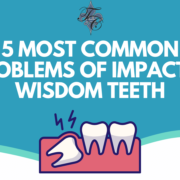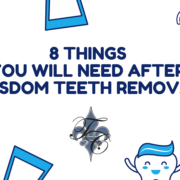8 Things You Will Need After Wisdom Teeth Removal
/in wisdom teeth/by adminHaving your wisdom teeth removed is a pretty common procedure, but it can still end up being a serious surgery if your teeth are impacted — and a painful recovery even if your wisdom teeth weren’t impacted.
Your post-removal care is very important, because if you don’t take care of your wounds you could end up with a lot of needless extra pain, swelling and infection.
Here are 8 things that will save you while you rest up and recuperate:
- Extra gauze and tissue: Your dentist and/or oral surgeon will keep gauze in your mouth for about 30 minutes after the teeth are removed, but your mouth will likely keep bleeding a little even after you get home. Don’t panic: this is expected. Just make sure you have some extra gauze and tissues handy to bite down on to help with the bleeding.
- Ice packs: If you’ve never seen anyone immediately after a wisdom teeth removal, you might be surprised to see how swollen your face can be. Ice packs can help with the excessive swelling — and it helps to ease (or at least numb) the pain.
- Soft foods: Having your wisdom teeth removed isn’t all bad: you’ve got an excuse to eat lots of ice cream! Soft foods will be your best friends in the days after your wisdom teeth are pulled. Be sure to have a supply of soups, broths, yogurt, applesauce and other things you don’t have to chew. Stay away from carbonated beverages, as well as popcorn, peanuts and pasta.
- Comfortable pillows and blankets: One thing you’ll certainly need following your procedure is rest. And lots of it. Rest will help you to heal faster. Plus, you won’t have too many places to go with your face swollen like a chipmunk. It’s a good time to catch up on Netflix or a good book.
- Medication: Your dentist will likely prescribe an antibiotic to fight infection, as well as pain meds to manage the discomfort. Be sure to take these as directed. If you’re still feeling too foggy, ask a friend or family member to help you keep track of your medication intake.
- Water and extra fluids: You’ll want to hydrate a lot after your procedure. Drinking plenty of water and fluids will help with the healing process. But one thing you don’t want lying around post-wisdom teeth removal is a straw. Do not use a straw while you are recovering. The suction can cause problems and tear the stitches in your mouth.
- Warm salt water or mouth rinse: About 12 hours after your procedure, you can start rinsing with a diluted mouthwash or warm salt water to alleviate pain and help promote healing. But don’t forget: No straws!
- A friend or family member: Even if you’re the strong, independent type, you’ll want to have someone staying with you the first day or two after having your wisdom teeth removed. Not only will you need them to drive you home from the doctor’s office, you’ll want someone around to monitor your swelling and pain, and to be there in case your recovery goes awry. If your fever spikes or your stitches pop, you don’t want to be alone.
Why are they called wisdom teeth?
/in wisdom teeth/by admin
For many people, they affect the other teeth when they come in and often require surgery to remove them. Wisdom teeth get their name because of their fashionably late arrival to the party – right around the age when a person matures into adulthood and is “wiser” and said to be gaining a bit of wisdom in life.
Most cases involving wisdom teeth in the modern world cause problems, resulting in their removal or else damage the jaw line. So, the theroy suggest that we develop these teeth because our early ancient ancestor’s diets were so rough, including raw meat, leaves, nuts, berries, leaves, etc. These foods required extra chewing and as a result, experts believe that they are evolution’s way of giving us a helping hand, so to speak. The problem is that in today’s world of ever more processed food, they could be said to be several million years too late, making them not quite as wise as they would have us believe!
What should you do about your wisdom teeth?
If wisdom teeth grow in properly, fit in your mouth well, and have healthy gums around them, they can be left untreated. But more often than not, wisdom teeth don’t come in as they should. Sometimes the jaw simply isn’t large enough to accommodate them, so they’re not able to break through the gum line properly.
Then they become impacted wisdom teeth; stuck in the jawbone underneath the gum line. Impacted wisdom teeth can cause swelling, pain, and infection of the gum tissue surrounding the area. They can also cause shifting of the other teeth as they try to erupt. If you are a part of the 85% of people that need their wisdom teeth removed, you will be looking at an extraction.
How easy or difficult it is depends on the position of the tooth and how far along it’s developed. A wisdom tooth that’s impacted usually takes a little longer to extract. But have no fear, your Lafayette dentist, Dr. Chauvin will discuss your individual situation with you and let you know exactly what’s involved with the removal of your wisdom teeth and how we can manage any of your concerns.
What happens during wisdom teeth removal?
After discussing the procedure, you and your dentist will choose the type of anesthesia that will be used during your surgery. There are three main options for wisdom teeth removal. There is local anesthesia in the form of an injection near the surgical site; sedation anesthesia, which is given to you through an IV in your arm; and general anesthesia, where you inhale medicine through your nose. If you’re having all four teeth removed, you will most likely be put to sleep during the surgery.
The night before the procedure, you won’t be allowed to eat anything after midnight. Once arriving medical team will give you anesthesia to make you fall asleep or apply local anesthesia to numb the surgical areas of your mouth, depending on your procedure type.
To remove the tooth, the dentist will cut your gum and remove your tooth – Typically, being cut into sections.
After the procedure, the dentist will sew up the area with some stitches, if necessary. Most dentist use sutures that dissolve or fall out on their own. You’ll have some gauze placed in your mouth to help stop the bleeding. If you’re having four wisdom teeth removed, the procedure will take about 30 minutes.
If you end up needing wisdom teeth extracted contact your favorite Lafayette Louisiana dentist Dr. Chauvin today and schedule an appointment.


